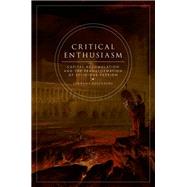Critical Enthusiasm Capital Accumulation and the Transformation of Religious Passion
, by Rosenberg, Jordana- ISBN: 9780199328826 | 019932882X
- Cover: Paperback
- Copyright: 9/1/2013
The Atlantic world of the long eighteenth century was characterized by two major, interrelated phenomena: the onset of capital accumulation and the infusion of traditions of radical religious rapture into Enlightenment discourses. In exploring these cross-pollinations, Critical Enthusiasm shows that debates around religious radicalism are bound to the advent of capitalism at its very root: as legal precedent, as financial rhetoric, and as aesthetic form. To understand the period thus requires that we not only contextualize histories of religion in terms of the economic landscape of early modernity, but also recast the question of secularization in terms of the contradictions of capitalism.
Critical Enthusiasm contributes to new directions of scholarship in literary and legal history, secularization studies, and economic criticism. It is unique in producing a model for literary and cultural study that is simultaneously attuned to economic and religious forces. By approaching the history of capitalism through religious debates, Critical Enthusiasm discloses significant intersections of aesthetic form and of financial flows that have been hitherto ignored. Through chapters that highlight moral philosophy, religious prophesy, early modern statute law, poetry, and political theory, Rosenberg shows that the contested nature of enthusiastic rapture is crucial to understanding the major institutional transformations of early modernity. These transformations--colonial plunder, the rise of finance, the administration of racialized labor, and the legal reform that justified such practices--shaped the period; they also laid the foundation for our contemporary world.
Critical Enthusiasm contributes to new directions of scholarship in literary and legal history, secularization studies, and economic criticism. It is unique in producing a model for literary and cultural study that is simultaneously attuned to economic and religious forces. By approaching the history of capitalism through religious debates, Critical Enthusiasm discloses significant intersections of aesthetic form and of financial flows that have been hitherto ignored. Through chapters that highlight moral philosophy, religious prophesy, early modern statute law, poetry, and political theory, Rosenberg shows that the contested nature of enthusiastic rapture is crucial to understanding the major institutional transformations of early modernity. These transformations--colonial plunder, the rise of finance, the administration of racialized labor, and the legal reform that justified such practices--shaped the period; they also laid the foundation for our contemporary world.






